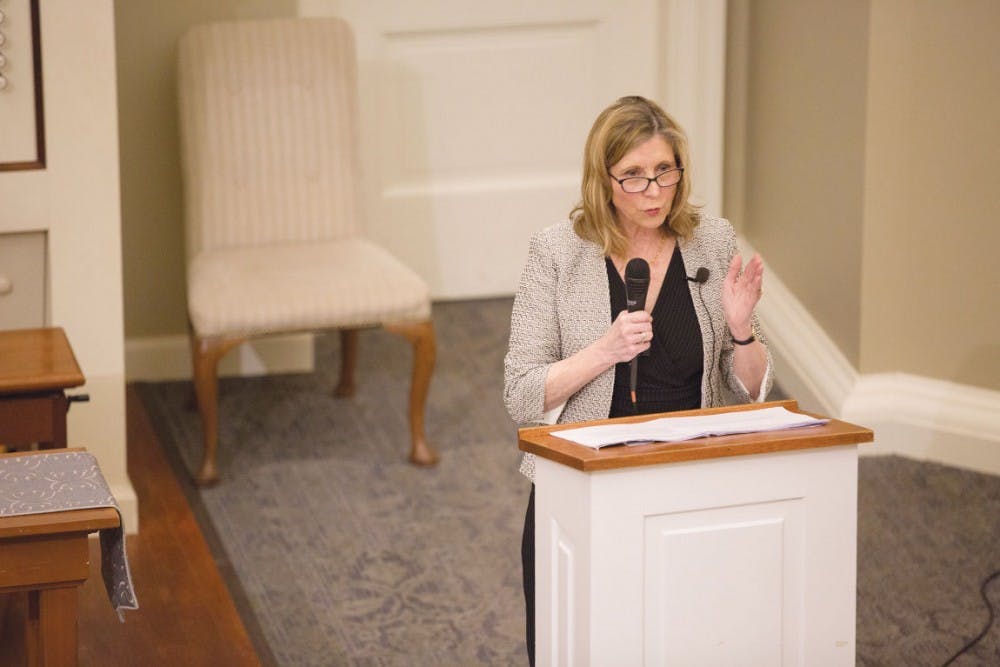Christina Hoff Sommers brings topics of trigger warnings, modern feminism and free speech to George Washington Forum at OU.
Christina Hoff Sommers has encountered some resistance from campuses she’s been to. Sommers said although she didn’t feel scared, her visit to Oberlin last year was the first time she had been provided with security guards.
While her visit to Oberlin was contentious, Sommers was well received at Ohio University on Tuesday night.
Robert Ingram, the founding director of the George Washington Forum at OU, said he was initially approached about bringing in Sommers by Anna Lippincott, the president of OU College Republicans. The forum has, on occasion, worked with student groups to bring speakers to campus.
Sommers, a resident scholar at the American Enterprise Institute and author of several books and articles, has been vocal about her stance on modern feminism throughout her career. Sommers said she identifies as an "equity feminist," which promotes equality between both men and women.
“She looks at the world a different way. She’s definitely a non-conformist,” Lippincott said. “She kind of expresses those grievances that the rest of us feel who maybe don’t identify with that 'hardcore feminist movement' right now.”
Sommers started the forum by talking about the Students Defending Students T-shirt controversy at OU, in which SDS member Isaac Smith challenged the university’s attempt to discipline the group for wearing T-shirts donning the phrase “We get you off for free” in a July 2014 lawsuit.
{{tncms-asset app="editorial" id="376e18fa-d355-11e5-916a-ff3c6a56e6d5"}}
Over the course of the evening, Sommers touched on a variety of topics, focusing mainly on trigger warnings, safe spaces and the importance of free speech.
“It’s primarily the 'fainting-couchers' demanding trigger warnings,” Sommers said, referencing the portion of the modern feminist movement who advocate for such warnings.
Sommers said as a feminist from the '70s, the emphasis on trigger warnings and safe spaces is puzzling to her.
“We are not children, we are not fragile," Sommers said. "Trigger warnings seem to be infantilizing to women.”
Sommers also spoke about the statistics commonly used by activists while addressing issues such as the wage gap or sexual assault. Those statistics are often overhyped, Sommers said, and although sexual assault is a problem, survivors of assault need help rather than hype.
“If women want to change the wage gap, they should change their majors,” Sommers said.
Sommers said while there was an interesting conversation to be had about the value placed on jobs occupied primarily by women, they aren’t necessarily being cheated.
“The vast majority of education majors will be women and the majority of engineering majors will be men,” Sommers said.
As women flourish at universities in general, Sommers said, there are fields where women are sparse. Furthermore, women also have certain benefits, she said.
For example, men are overrepresented in dangerous professions, Sommers said. Women also tend to be better educated and live longer.
“It’s a complicated mix of burden and benefits,” Sommers said.
Lindsey Curnutte, a sophomore studying journalism and political science, said she initially attended the event out of an interest to hear various sides of the topic of feminism.
Curnutte said although she didn’t agree with everything Sommers said, her overall message resonated with her — particularly about the infantilizing of women.
{{tncms-asset app="editorial" id="1c219f06-d439-11e5-b28e-f74697fa3d38"}}
Clinton Hedrick, the treasurer of OU College Republicans, said he appreciated her emphasis on free speech.
“Free speech goes across the board,” Hedrick said.
Sommers said some of what people see on college campuses is “fanaticism” and a “lust for punishment.”
“History is one long, long lesson in the dangers of combining moral fervor with misinformation,” Sommers said.
Ingram encouraged civil debate and said the best way to discredit a bad idea is by “public vetting,” and trying to silence it only gives it credibility.
“I’m an absolutist about few things — I’m a complete absolutist on free speech,” Ingram said. “I hope it at least got OU students thinking of the value of free speech."
@norajaara
nj342914@ohio.edu






